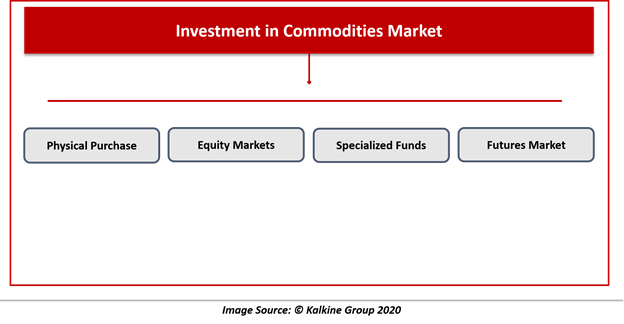Definition
Related Definitions
Commodity
We all have heard the stories of how people used to trade even before the currency was introduced in the human civilisation. Barter system was used to exchange one item as payment for another item. This is the basics of commodity trading, and today traders have a plethora of options to trade and invest in the commodities market.
Before going any further, let us discuss commodity and what sorts of goods come under commodity.
What is a commodity?
A commodity is basically a natural resource which can be used as raw material for creating goods that carry some monetary value. For example, iron ore is a commodity which is a basic raw material for the steel industry, which in turn is used by automobile, construction and other industries.
In the above example, iron ore is a commodity which can be exchanged for a predetermined value or with another commodity carrying equal value during the exchange period. When U.S.A imposed an embargo on Iranian crude oil and banned the payment in dollars for Iranian crude, India devised a mechanism to purchase the crude with an exchange of some sort of farm product as payment.
Interesting Read : Why is Gold a valuable metal?
Basic Characteristics of Commodities
- One unit of a commodity can be used or exchanged for another unit of the same commodity without any loss of value. For instance, 1 tonne of iron-ore can be exchanged for another 1 tonne of iron-ore without any significant loss in value.
- The foremost characteristic of a commodity is that it is tradable. If a particular good is not tradable in the open market or at an exchange, it cannot be considered as a commodity. Gold can be traded easily around the world, but feasible Uranium cannot be listed on an exchange or traded legally by investors. Technically, Uranium is also a metal and used as a fuel for power generation but cannot be traded in the open market.
- If the commodity is tradable, it should have liquidity. Liquidity ensures that high number of people are interested in buying and selling of a particular commodity at any given point in time. There is no cap on the amount of buying and selling.
- Commodities should be deliverable also.
Some traditional examples of commodities are grains, gold, crude oil, natural gas and beef. Now a day’s currencies and indexes are also included in the commodity market. Some specialized commodity market also trades in bandwidths and duration of cell phone calls.
Trading in commodities involves complex strategies as it involves trading in derivative instruments. The equity market can also provide an opportunity to invest in the commodities market. If an investor buys equity shares of a crude oil-producing company, the investor is indirectly putting his/her money on the crude oil commodity.
Investment in Commodities Market

Physical Purchase
Physical purchase involves buying a commodity and taking delivery of the same. For instance, someone is interested in gold or silver commodity; the investor has to buy the commodity and has to take possession. The investor can hold the commodity till the appropriate price is not reached.
The method is not practical in normal trading for an individual investor. Suppose if someone is interested in crude oil, delivery of which needs specialised equipment and know how. So it is not practical to make the physical purchase of commodities in most of the cases.
Equity Markets
Equity market also provides an opportunity to invest in commodities indirectly. Investors can buy shares of companies that deal in commodities exploration or production. Investment in gold mining companies or oil exploration and production companies can provide returns as good as direct investment in commodities.
Companies like BHP Group or Rio Tinto are involved in the exploration and extraction of multiple valuable metals to coal to oil and natural gas. Many companies are into the extraction of a single commodity only.
Investment in shares of such companies can be linked to investment in the commodities as the business of the company is intertwined with the business of the commodity. Non-renewable power companies listed on a stock exchange can get affected by the price movement of coal or natural gas.
Specialized Funds
There are mutual funds and ETF's, providing opportunities to the investors to invest with limited risk into the commodities market. Certain mutual funds deal only in commodities and have experts providing valuable insights which can be used by investors who want to get better returns in commodities.
Some hedge funds are also created to invest in commodities. Hedge funds are generally open for wealthy investors who can invest huge amounts and can retain their investments for a minimum of one year.
Futures Market
Futures markets allow traders to use commodities to hedge their investments from market fluctuations. Consider the case of a crude oil refinery, for example. The refiner can calculate and easily estimate the requirement of crude oil in by the refinery. Also, there are refinery products whose consumption are cyclic and are affected by seasons. Certain fuel oils natural gas is required in higher quantity during winters in European countries.
Since the supply and demand can be estimated easily based on past experience, the crude oil market is highly volatile and cannot be predicted with certainty. If the refiner wishes to fix the price of crude oil for its consumption, it can buy a futures contract in the markets.
This way, the refinery can hedge itself from the market volatility. The future contracts involve partial payment for the entire volume or quantity of the commodities. The delivery can be accepted at a price for which future contract was purchased after the expiry of the contract period.
